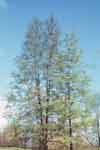 |
 |
 |
|
|
|
Blossoms of Black Cherry G. Lumis |
Black Cherry G. Lumis |
Bark of Black Cherry G. Lumis |
Common Names: Black Cherry, Wild Black Cherry
Scientific Name: Prunus serotina
Summary
Foliage: Green oval leaves, orange fall colour
Height: 60 to 100 feet
Spread: 30 feet
Shape: Oval
Growth Characteristics: Moderate growth rate
The Black Cherry tree is the tallest of the cherry trees and has drooping clusters of white flowers that appear in the spring. It flowers later than other native cherry trees. The small fruits that ripen in the summer provide food for birds. The fruit is edible, but somewhat bitter in taste. Its ornamental bark is rough and black, but it is shiny on young branches.
Plant Needs
Zone: 3 to 9
Light: Full sun
Moisture: Keep soil moist
Soil Type: Neutral to acidic, tolerates sandy and gravelly sites
Problems
The dark fruits will stain concrete when they fall to the ground and thus make messy street trees. This species is prone to tent caterpillar attack and black knot.
Cultivars of PRUNUS SEROTINA
'Asplenifolia'-- deeply cut, narrow leaves
'Pendula'-- a slow-growing form with drooping branches and twigs
'Pyramidalis'-- of conical habit
'Phelloides'-- pendulous branches, leaves hanging loosely and pendulous like the willow
Notes
Prunus is the old Latin name for the plums and cherries; serotina refers to the lateness of the flowering.

